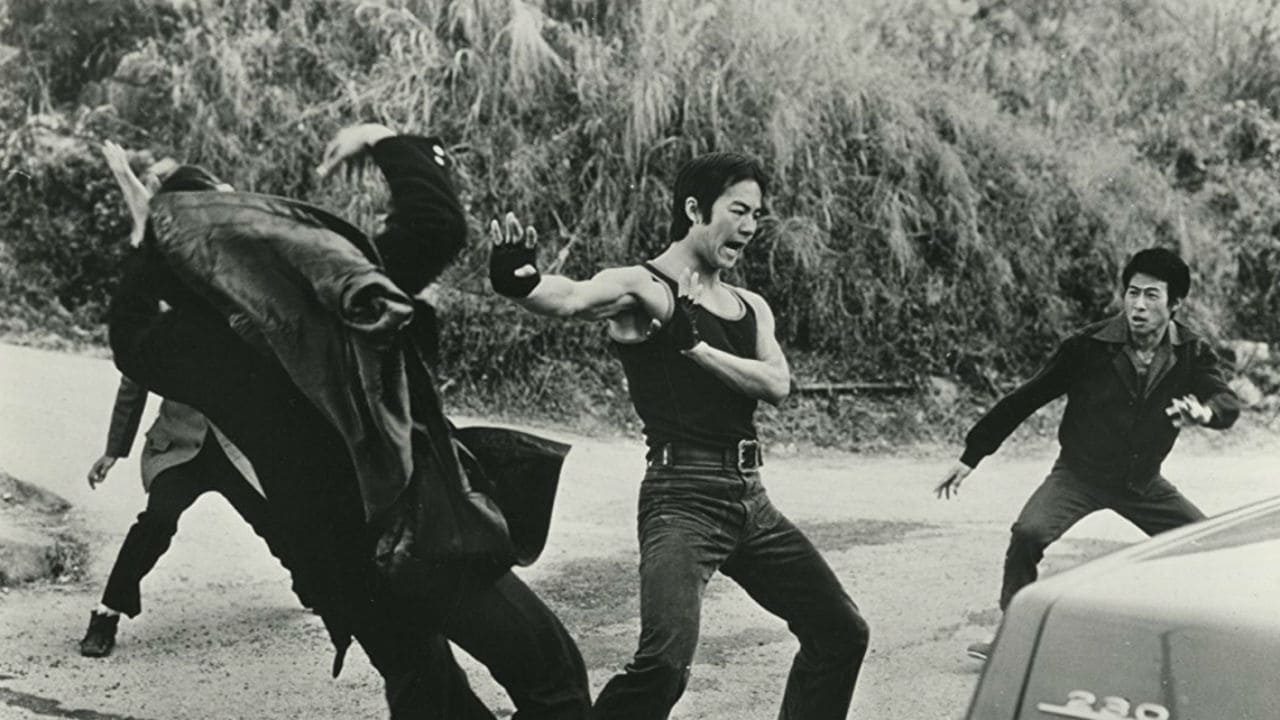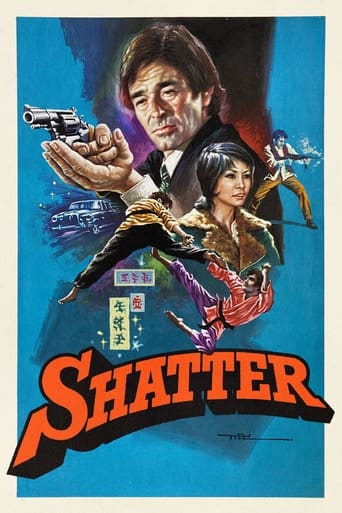

Most undeservingly overhyped movie of all time??
... View MoreAlthough it has its amusing moments, in eneral the plot does not convince.
... View MoreI didn’t really have many expectations going into the movie (good or bad), but I actually really enjoyed it. I really liked the characters and the banter between them.
... View MoreThrough painfully honest and emotional moments, the movie becomes irresistibly relatable
... View MoreSHATTER is Hammer's second attempt at a Hong Kong-backed movie after the cult classic that is LEGEND OF THE 7 GOLDEN VAMPIRES. Whilst not an inherently enjoyable film like the former, SHATTER is a mildly interesting diversion with a good enough cast to make it worthwhile. Although the film has a fair few slow patches where the interest wanes through lack of action, generally the plot, which concerns a hit-man trying to collect his fee, is engaging and the action realistic.This isn't a James Bond-style adventure as the title might suggest; the movie strives for realism over comic book style and the result is a gritty, downbeat, sporadically exciting foray into the world of the international thriller. The unconventional lead is played by Stuart Whitman, who enjoyed a brief status as a leading action man in the 1970s after he appeared in this and some Italian thrillers. Whitman is hardly an athletic hero, but his hang dog looks and his steely determination go part way in letting the audience empathise with his character's situation.Things begin with some stock footage of African race riots and moves into a bloody assassination scene, where Whitman uses a gun disguised as a camera to take care of his contract! From then on we see him hiding out in a seedy Hong Kong hotel room and biding time while he tries to figure things out. SHATTER isn't a film which shows Hong Kong in a very good light – in fact the film has a sleazy, depressing atmosphere and the crowded setting only makes things worse.Whitman visits his German contact Hans Luber (played by genre favourite Anton Diffring) but is unable to collect his fee, and instead finds himself beaten up by violent policemen. These two scenes highlight two excellent cameo performances. The first is Diffring's; the typically sinister character of Luber is a great role to play and Diffring is his usual snide, evil self in the part. Secondly we have Peter Cushing in the role of Paul Rattwood, which is more like an extended cameo. Rattwood is an official in the secret police and a rather nasty character who knows more than he lets on and who keeps a gang of thugs under his command. Cushing is of course excellent in the role and gets some nicely sharp-tongued dialogue to himself; but sadly this proved to be his last role for Hammer Studios and a rather inconspicuous swan song for the golden age actor. Still, the moments when he is on screen sparkle and he seems to be enjoying himself, which is enough for me.Whitman moves into a seedy massage parlour/restaurant owned by Ti Lung, at the same time beginning a tragic romance with Lily Li who works there. The rest of the film shows him basically hanging out and eventually doing a trade with Diffring (an unbearably suspenseful scene), who wants the top secret documents in Whitman's possession. But the treacherous Diffring betrays our down-at-heel hero, leading to an action-packed finale where Whitman and Lung storm the enemy's retreat.Most of the action towards the end of this film focuses on Lung, who is portrayed as a young, unstoppable martial arts hero in the line of Bruce Lee. Lung is a tour-de-force in the action stakes and the scenes of him fighting are tremendously exciting and violent. Lily Li is also pretty good as Mai, although she doesn't get to fight in this movie. SHATTER isn't a very engaging movie, but the direction is solid, there is enough action and gore to satisfy the male crowd, and the cast alone makes it worthwhile. Don't be fooled, this is no classic, but it remains watchable enough if you're in the right mood.
... View MoreIn my review of Joseph Losey's THESE ARE THE DAMNED (1963), I had written that Hammer Films' way out of their conventional rut (particularly during the early 1970s) was by recruiting talented film-makers who operated not so much within the mainstream but rather around its edges. Expatriate American Losey was thus an ideal choice to kick-start this intriguing venture (having conveniently relocated to the U.K.) but, while his first effort for the company – the excellent short thriller MAN ON THE BEACH (1956) – adhered reasonably close to the Hammer standard (they were still to gain a reputation for garishly-colored horrors and complexly-plotted chillers), the second (the above-mentioned title) was easily their hardest-to-categorize and most pretentious – if undeniably brilliant – outing...which, I guess, put paid to the notion of their continuing this 'shaky' practice! Still, out of the blue (and when they were probably at their lowest ebb, since the company would basically fold in a couple of years' time!), they made another attempt in this direction by persuading cult American film-maker Monte Hellman to make an action thriller – as part of a current deal with famed Hong Kong producers The Shaw Bros. – for them. Apparently, he had recently undergone an extensive location tour of the Orient for a project that had subsequently fallen through – indeed, he claims he was only approached by Hammer in view of his familiarity with the place (which obviously saved them the time and money another director would have spent there in pre-production)! However, this time around, the subject matter was not congenial – especially since the company were contract-bound to incorporate martial arts sequences by a Bruce Lee wannabe – and, frankly, it all looked pretty desperate from the outset (crossing POINT BLANK {1967} with ENTER THE DRAGON {1973})! To make matters worse, the cost-conscious Shaw Bros. liked to shoot their pictures back-to-back utilizing the same crew so that, by the time they came to the SHATTER lot, they would be all but exhausted! – similarly, star Stuart Whitman (past his prime and haggard-looking) would have started boozing by then and prove just as unfocused on his work! Faced by all this, Hellman unsurprisingly fell behind schedule and, yet, Hammer chief Michael Carreras took it out on him and, three weeks into the shooting, had the director fired, eventually taking over control himself (as he had done on BLOOD FROM THE MUMMY'S TOMB {1971} following original helmer Seth Holt's death) and even got sole credit but it reportedly took him 6 months to finish the picture considering that, by all accounts, some two-thirds of it were already pretty much in the can (actually, Hellman had subsequently refused to edit his footage, so Carreras must not have had an easy time getting the whole to make sense and, frankly, work)! Anyway, Whitman is a hit-man (elaborately utilizing a gun hidden inside a camera for the job) duped into working for the mob to eliminate an African dictator. When he turns up to get paid, the hero is not only given the cold shoulder (by his nefarious contact Anton Diffring) but himself becomes the target of assassination thereafter (these include taking a pot-shot with a bazooka at what is thought to be his hotel room)! Complicating matters further is the vague presence of a sinister/eccentric secret-service official (Hammer stalwart Peter Cushing in his inauspicious last theatrical appearance for the company, though his own personal contribution is dignified as ever). Somehow, Shatter (presumably the protagonist's code-name: his rough manners rendered more prominent by the American retitling CALL HIM MR. SHATTER – complete with a title song better suited to some "Blaxploitation" offering!) befriends a couple of local siblings: he being the Kung-Fu master and she obviously falling for the American tough guy. For no obvious reason, they join him in his crusade to get even with the mob and, even more pointlessly, the Oriental is involved (and naturally emerges victorious) in a martial-arts competition; in the end, the girl dies stopping a bullet meant for Whitman and Cushing (after having had his men beat up Shatter, a 'compliment' our hero later returns!) emerges from the shadows to reveal himself a benign figure after all – with Diffring and the dictator's own brother being fingered as the real villains (who expire in a hilarious joint fall, after being riddled by bullets, through the large glass-pane of the former's office)!Incidentally, the edition of the film I watched includes a couple of censored violent moments (the inserts immediately recognizable from the sudden drop in picture quality) missing from the R1 Anchor Bay DVD. The accompanying Audio Commentary is, however, available and Hellman was certainly a sport in opting to take part: he dutifully points out the scenes he did or did not shoot but readily takes the blame for the film's ultimate lameness (amazingly, it came in-between two of his best-regarded American works i.e. TWO-LANE BLACKTOP {1971} and COCKFIGHTER {1974}, whose own viewing is upcoming in my ongoing Hellman retrospective)! The track proves just as laid-back as the movie itself (incorporating the occasional interjections from a separately-recorded Whitman who seems to be quite fond of it and Hellman, despite apparently bearing a grudge against The Shaw Bros., taking as he does every opportunity to denigrate them!) with moderator Norman Hill (who presumes this may well have been Whitman's last gasp as a leading man, but he was actually still good for another 10 years or so – including the somewhat similar Italian poliziottesco SHADOWS IN AN EMPTY ROOM aka BLAZING MAGNUM {1976}) querying the director about his other work and influences (singling out the outsider protagonists in the films of both John Huston and Carol Reed), and even about his own opinion on Hammer's more typical output (which he tackles in an off-handed, albeit diplomatic, fashion).
... View MoreLong unavailable on home vid, this was just one of the many projects that cult maestro Monte Hellman ghost-directed. So when the good folks at Roan decided to release this on LD, I jumped at the chance to get a copy. At forty bucks, it was worth it. But I had to order off the Dollar Menu for the rest of the week.It was a long-held belief that Hellman only directed a small portion of the film before being sacked and replaced by producer Michael Carreras. But in the running commentary, Hellman, upon seeing the movie for the very first time, was surprised to see that at least 80% of the final cut is his.Though no "Background to Danger," this is a very passable B-adventure, with Whitman a fine hero/foil. Whitman's Shatter is another in the long line of Hellman loner-man-on-the-outside-looking-in protagonists. The film also bears striking similarities with the long forgotten "Karate-the Hand of Death" (1961)about an American Karate expert returning to Japan after the war and runs afoul of some mob types. "Shatter" is a decent way to spend an hour and a half on a rainy afternoon, and a find for Monte Hellman completeists.
... View MoreKicking, shooting and beating aplenty in this Hammer/Shaw Brothers co-production starring Whitman as a hitman with a conscience. Not much here you haven't seen before, but Whitman is OK, the music is kinda funky and, while he doesn't have much screen time, it's always great to see Peter Cushing.
... View More